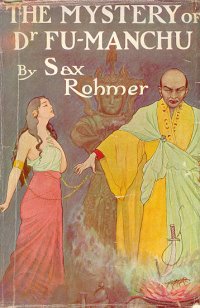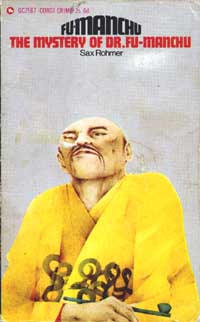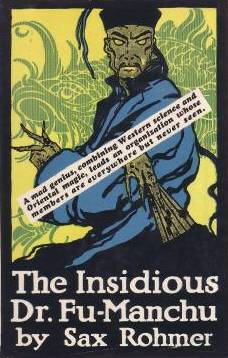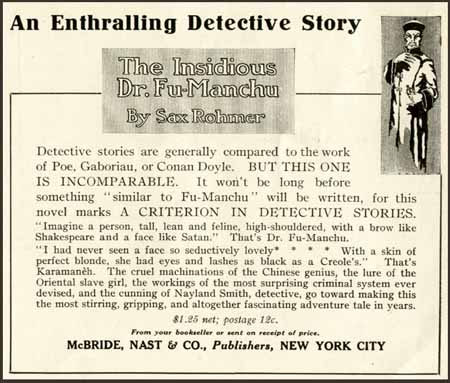Blogging The Insidious Dr. Fu-Manchu by Sax Rohmer, Part Ten – “The Spores of Death”
 “The Spores of Death” was the penultimate installment of Sax Rohmer’s serial, Fu-Manchu.
“The Spores of Death” was the penultimate installment of Sax Rohmer’s serial, Fu-Manchu.
First published in The Story-Teller in June 1913, it later comprised Chapters 24-26 of the novel, The Mystery of Dr. Fu-Manchu (re-titled The Insidious Dr. Fu-Manchu for U. S. publication).
The story starts off appropriately with our narrator, Dr. Petrie, acknowledging the storyline is drawing to a close and apologizing (very nearly breaking the literary equivalent of the Fourth Wall in so doing) for his haste in not better detailing characters and incidents as he was forced to maintain the breakneck pace of the events as they transpired.
Dr. Petrie then spends some much welcome time discussing the mysterious origins of Dr. Fu-Manchu. Petrie suggests the name (ridiculous to modern, informed readers) is an assumed one and disassociates him with the Young China movement (the Republicans who came to power after the fall of the Manchu Dynasty) as he had speculated early on.
 The story itself leads the reader on a false trail (as we have seen previously, Rohmer relished violating genre expectations).
The story itself leads the reader on a false trail (as we have seen previously, Rohmer relished violating genre expectations).
A raid is conducted on Dr. Fu-Manchu’s Limehouse base of operations where Petrie is reunited with his beloved Karamaneh and her brother, Aziz.
Just when the raid begins, Petrie, Nayland Smith, and Inspector Weymouth are forced to watch in horror as the Scotland Yard men walk into a trap in Fu-Manchu’s fungi cellars.
As the poisonous spores bring about the rapid and painful death of Weymouth’s men, Dr. Fu-Manchu discards his honorable demeanor and reveals himself as a madman shouting, “They die like flies….I am the god of destruction!”
 The story progresses quickly to a daring escape and boat chase on the Thames where Fu-Manchu injects Inspector Weymouth with the poison bacilli during the climactic struggle.
The story progresses quickly to a daring escape and boat chase on the Thames where Fu-Manchu injects Inspector Weymouth with the poison bacilli during the climactic struggle.
Both men fall overboard and are believed to be drowned as the story reaches an unexpected and abrupt ending leaving readers eager for the final installment and Petrie and Smith grieving for their fallen comrade.
At the start of the story Rohmer provides a lovely quote from Omar:
“We are no other than a moving row
Of Magic Shadow-Shapes that come and go
Round with the Sun-Illuminated Lantern held
In Midnight by the Master of the Show”
The author’s choice in associating his thriller with shadow play and forgotten Music Hall traditions highlights the theatrical association of Oriental villains with stage magicians.
 This theatricality lies at the heart of the best Yellow Peril stories.
This theatricality lies at the heart of the best Yellow Peril stories.
The sense of fun, of captivating audiences with the exotic, and providing safe thrills outweigh the modern viewpoint that these stories were little more than xenophobic fantasies worthy of condemnation – the scornful paranoid delusions of Imperialists who refused to accept their Empire was in decline.
The racist label cannot be refuted in retrospect, but such stories were a far cry from Birth of a Nation.
These fanciful tales of Asian and Egyptian villains, like the stories of Jewish villains from the Victorian era, while offensive to modern eyes, represented an enticing exploration of foreign cultures in a far more insular day.
The much smaller world of Edwardian England welcomed such forbidden fruit, and without it to whet the appetite of readers on both sides of the Atlantic, it is unlikely the breaking down of barriers would have come as quickly as it did amidst the ever-increasing speed of the last century.
This may be ironic considering the intent of many of the authors of such fiction, but for a man out of step with his times like Rohmer, a man whose very soul hungered for Egypt and all points East; it did not come soon enough.
 Fortunately, his success as a writer beginning with this, his first book afforded him many such visits to the East in his lifetime.
Fortunately, his success as a writer beginning with this, his first book afforded him many such visits to the East in his lifetime.
It is doubly fortunate for his readers, for these visits provided the fuel for the numerous bestsellers he would pen, a dozen more Fu-Manchu thrillers among them as we shall see in due course.
For now the stage was set for the Grand Finale and readers in the UK and US waited with baited breath for Rohmer to deliver the goods.
He would not disappoint, but he was also determined to surprise.
William Patrick Maynard was authorized to continue Sax Rohmer’s Fu Manchu thrillers beginning with The Terror of Fu Manchu (2009; Black Coat Press). He is currently working on a sequel, The Destiny of Fu Manchu as well as The Occult Case Book of Sherlock Holmes. To see additional articles by William, visit his blog at SetiSays.blogspot.com